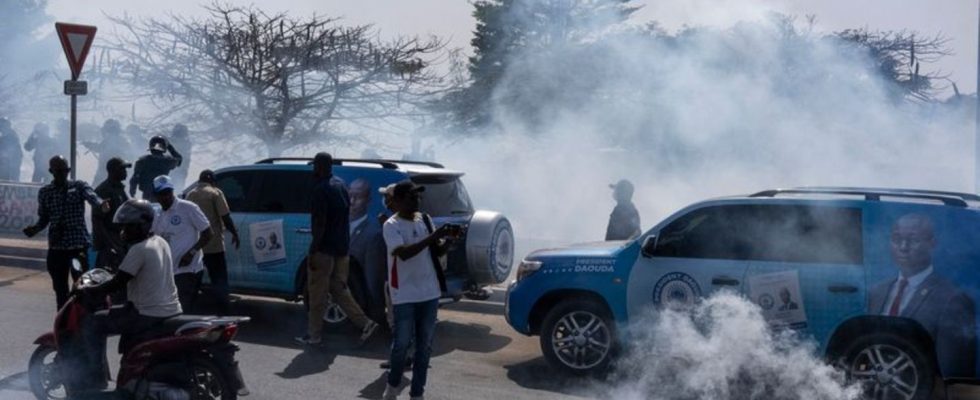After election postponement
Three dead after protests in Senegal
Senegalese riot police in Dakar use tear gas against opposition supporters. photo
© Stefan Kleinowitz/AP/dpa
Since the elections were postponed, things have been simmering in Senegal, West Africa. Human rights activists are calling for an investigation after deaths and injuries during protests.
After deadly protests against the postponement of the presidential election in Senegal, authorities in the West African country today banned planned demonstrations and switched off mobile internet. The United Nations human rights office and the human rights group Human Rights Watch called for an independent investigation into the police crackdown on protests last weekend, in which at least three people were killed.
Senegal, peaceful since its independence in 1960, is in crisis after the president and parliament decided to postpone elections scheduled for the end of February. Macky Sall, who has been in office since 2012, continues to insist that he will not run for a third term. However, parts of the opposition and other critics accuse him of a constitutional coup.
Human Rights Watch reported that at least three people were killed in the operation against demonstrators on Friday and Saturday, including a 16-year-old boy. The number of injured was put at 60. At least 271 people were arrested. Journalists were also attacked at work. For the report, the organization interviewed those affected and eyewitnesses and gained insight into medical documents. According to an HRW report, security forces used excessive force against demonstrators last year.
UN and human rights organizations express concern
United Nations officials expressed “deep concern.” “Following reports of unnecessary and disproportionate use of force against demonstrators and restrictions on public spaces, we call on the authorities to ensure they uphold Senegal’s long tradition of democracy and respect for human rights,” said the office of the UN High Commissioner for Senegal Human rights in Geneva.
The Senegalese authorities again temporarily switched off mobile internet. The Ministry of Communications cited “hateful and subversive messages that have already provoked violent demonstrations with deaths and significant property damage.” A march through Dakar registered by the opposition was banned by the authorities citing obstruction of traffic.
Accusations against opposition leaders and political tensions
Last week, the authorities had already cut off mobile internet for around 24 hours, as they did for the first time during protests in the summer of 2023. At that time, demonstrations escalated after the conviction of opposition leader Ousmane Sonko, who was considered pan-Africanist and critical of the elite, in a defamation and abuse trial. According to Human Rights Watch and civil society organizations, hundreds of protesters have been in prison since then.
Sonko himself has been in custody since the end of July on further charges, including endangering state security, and was not allowed to run in the election originally scheduled for February 25th due to the conviction. His Pastef party was dissolved, but its former general secretary Bassirou Diomaye Faye was considered a promising candidate. Among the 20 candidates admitted to the election was Prime Minister Amadou Ba, who was nominated by the president as his successor.
Political decisions and international reactions
The bill postponing the election was introduced by the liberal opposition party PDS, whose candidate Karim Wade was not approved as a candidate. After turmoil in parliament, members of the government camp and the PDS decided on February 5th with 105 out of 165 votes to postpone it to December 15th. Sall had previously canceled the election date in a televised speech, citing the lack of stability.
The postponement of the election also caused concern among the EU, USA, African Union and the West African community of states Ecowas. Senegal was considered a stable, multi-party democracy in a region where democracy is increasingly threatened by coups and autocratic presidents. The state with almost 18 million inhabitants is the only one of its neighbors that has not experienced a revolution or civil war.

